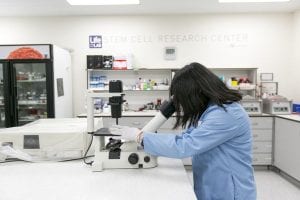
DAVID GRAHAM
CHIEF INNOVATION OFFICER
CITY OF CARLSBAD
When news hit that COVID-19 had reached the United States and was about to spread, the life sciences industry saw it as a call to action to contain the threat, and Carlsbad-based firms were on the front lines of that effort. At the time this a r t i c l e was written, several Carlsbad firms had received emergency use authorizations for weapons to fight the COVID-19 outbreak.
One of those was Thermo Fisher Scientific, a global company with West Coast headquarters here in Carlsbad. In March the firm received emergency use authorization from the Food and Drug Administration to produce coronavirus test kits capable of delivering a diagnosis within four hours.
The authorization of Thermo Fisher’s diagnostic test “will enable medical staff to respond swiftly to treat those who are ill and prevent the spread of infection,” said Marc N. Casper, Thermo Fisher’s CEO, at the time of the announcement.
The life sciences sector is one of Carlsbad’s largest, with over 111 firms and more than 6,300 people working in the field, which is 13.5 times the national average. The sector continues to grow, with employment increasing by 2.4% from 2016 to 2018. Thermo Fisher is one of the city’s largest employers, with more than 2,000 people in Carlsbad.
Another Carlsbad-based company involved in the fight to contain COVID-19 is GenMark Diagnostics, which received emergency use authorization for its COVID-19 test that delivers results in two hours. Rapid detection of the virus is critical in cases where a hospital needs a quick diagnosis, and GenMark’s proprietary system is relatively compact and easy to use.
And Active Motif, another Carlsbad firm, announced in February that its Shanghai subsidiary developed a screening tool to isolate COVID-19 antibodies from patients recovering from coronavirus-related pneumonia, which has long-range implications for diagnosis and treatment. Active Motif collaborates with scientists around the world to develop diagnostic tools, clinical trials and vaccine designs to control the spread of disease.
Collaboration is a big part of the life sciences scene, and a Carlsbad nonprofit, the Open Biopharma Research and Training Institute, opened last year to improve training and process development, with the goal of reducing the end price of pharmaceuticals.
Training for biopharmaceutical manufacturing and research and development is, understandably, highly specialized and expensive, and a small firm trying to bring a new drug to market faces high relative costs. Open Biopharma makes hands-on training cheaper and easier, lowering those costs. It also allows firms to test equipment on Open Biopharma’s Sandbox Lab here in Carlsbad, to see how different instruments can work in combination without bearing the initial purchase cost.
“We are the only biopharma manufacturing training institute on the West Coast,” said Rich Jaenisch, Director of Education and Outreach for Open Biopharma, which shrinks time and money outlays for firms that would otherwise have to train on the East Coast.
At the time this was written, Open Biopharma was trying to help a firm secure emergency use approval for a device that would improve the efficiency of ventilators, Jaenisch said. This can be an advantage for hospitals treating COVID-19 patients who need to spend time on a ventilator, as the longer a patient is on a ventilator the lower the chance of recovery.
“I’m hoping we can help because this is a terrible situation we’re in,” Jaenisch said.
The City of Carlsbad itself has made a contribution to promoting the life sciences. In 2013 Carlsbad teamed with Joseph Jackson and Kevin Lustig, co-founders of Bio, Tech and Beyond, a life sciences incubator. The incubator’s concept was to rent lab benches and equipment at low cost to scientists looking for a way to test their ideas to bring them to market. The city helped launch the incubator by providing a building at low rent.
After seven years Bio, Tech and Beyond has helped 65 companies get started and the incubator moved in December into larger, private quarters, where all 27 of its lab benches are occupied, said Jackson, who continues to run the lab. He notes that a pandemic like COVID-19 was predictable, and the role of the individual scientist in contributing to an overall solution is underrated.
“Carlsbad is a real powerhouse for life sciences and there’s always going to be that person who wants to come in and try their idea,” Jackson said. And that’s why Carlsbad’s life sciences community is so important both locally and globally.